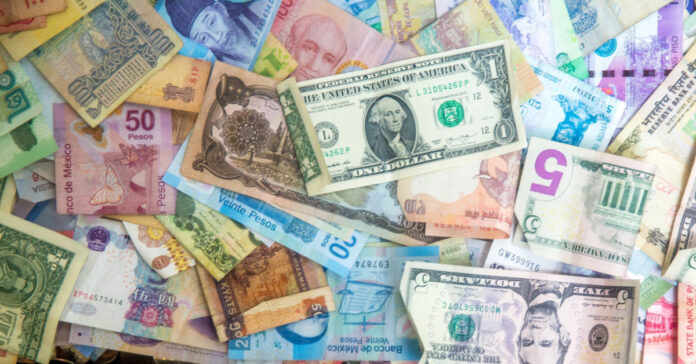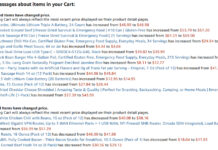Imagine a world where 7 ounces of coffee costs $5,800,000. That’s what hyperinflation can do. In fact, that’s what happened in Venezuela with the bolivar, their currency. Anyone supporting the big spending socialist programs should keep in mind that this is where they end up.
In the third devaluation of its currency in 13 years, the country just removed six zeros from its bolivar, meaning the coffee will now cost 5.8 of the new bolivars. The country had previously cut three and five zeros off, which helps avoid the need for a 1 trillion bolivar bill.
To give the U.S. dollar the same buying power the dollar had 100 years ago, we would have to cut two zeros off. If we did that, the humble penny would have the same buying power of a $1 bill and I could get a breakfast biscuit combo at the drive through for a nickel. Ah, the good old days back before the Federal Reserve was created. Think what it will be like when you need a $100 bill to buy a soda, or when the dollar store is known as the $100 store. That’s what lies down the road.
Devaluation happens to all fiat currency. It’s not a matter of if, but when or, more accurately, how fast it degrades. Just because the dollar is being devalued more slowly than the bolivar doesn’t mean we aren’t still racing toward the basement. I talked about the death spiral before, and how the closer we get to the center, the faster things deteriorate. Our economy is following that exact track.
Plan for Inflation
No one denies that inflation is here in the U.S. (and much of the rest of the world). The debate is about how long it will last and how high it will get. I have articles posted about how to prepare for inflation and hyperinflation, and I encourage you to review these now if you have not yet done so. There may still be time to take some steps to prepare yourself financially.
Beyond those general articles, here are a few things you should ask yourself as we stare inflation in the face:
What are you prepared to give up, cut back on, or sacrifice when the cost of goods raise so much faster than your income that you cannot afford everything you buy and do today?
These can be services, such as having your lawn mowed by a landscaping company, getting your nails done, having a cleaning service, etc. Consider doing these yourself to save money.
The list should also include activities to give up, such as going out to eat, going on vacation, paying for your kids private lessons or having half a dozen streaming services.
Finally, there are lifestyle changes. For example, if you lease a car for three years and then get a new one, consider buying it out, paying it off, and eliminating the monthly car payment. If you upgrade your phone every year, stop. Don’t remodel your house, buy new furniture, or buy collectibles. (Wait until the inevitable deflation and then buy if you still have a job and the funds to do so.)
What recurring monthly expenses can you eliminate?
Can you cut back on utilities, reduce your phone bill, cut the cord for cable, get rid of some streaming services, get rid of a car, get out of your timeshare, ubsubscribe to all those your subscriptions services, etc.
What can you do to make more money?
Can you get a part time job? Can you start a side gig? Do you have a hobby you can use to generate money? Can you teach lessons? Can you tutor kids? Do you have tools and skills you can use?
Do you have something you can sell to raise cash?
Most people consider this last, when they are desperate, but you may get better prices before the economy is completely in the toilet.
Do you have a boat or a classic car you can sell? Do you have a collection that is worth money? This can be anything from baseball cards to antiques to guns. Could you sell your house and use the cash to buy a smaller one with no mortgage? (You can always buy back bigger after the financial crisis is over.)
Draw the Line
Besides planning what you can do, I think it is important to draw the line on what you won’t do. (If you are married, I recommend you and your spouse develop the list together.)
For example, there may be somethings that are sacrosanct. Maybe you agree not to sell the jewelry she inherited from her mother and the guns his father left him. You could also decide that whatever happens, you will always host Thanksgiving for the family, regardless of the sacrifice. It could be simple things, like she won’t give up getting her hair done and he won’t give up going out with the boys once per month.
Think About After the Crisis
Financial crises inevitably end, although it often takes regime change in the case of a bad crisis. Fortunes are made when you buy after the market has crashed but before it has recovered. Identify opportunities during the collapse. Use your knowledge or skills to offer a service at the right time. Use any savings to buy something valuable when it is being liquidated. If you have any bullion, think about when to sell and use it to buy something that will appreciate more rapidly or can generate an income.
Yes, it takes money to make money, but after a financial crash, it doesn’t take as much money. If you have an income stream when many don’t, you can leverage that.
Inflation is ugly and the recovery may be scary. There will be change and disruption. If you can keep a roof over your head, food in your belly, an income stream, and keep your family together, you will probably come out ahead of 80 percent of the population. You can better your chances of success by making the tough decisions now, when you have time to think them through.
Being prepared means having food, water, shelter and medical supplies, but it also means having a plan. So plan, don’t panic. Ride it out and you might come out of the 20s in far better shape than you entered them.







